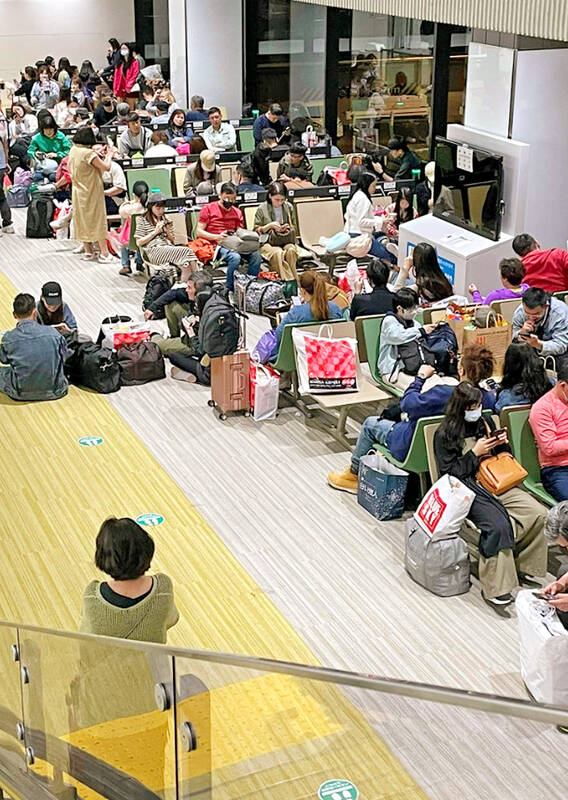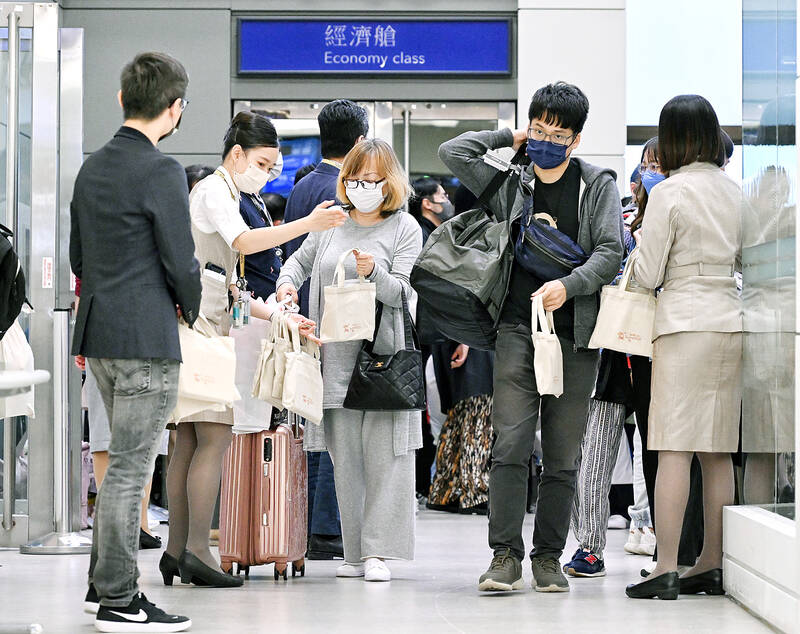The Civil Aeronautics Administration yesterday asked Starlux Airlines to issue an explanation after more than 300 Taiwanese passengers were stranded at Narita International Airport in Japan on Saturday night due to flight delays caused by crosswinds and problems with the airline’s aircraft.
The airline said in a statement that Flight JX803 to Taipei was scheduled to take off from the Tokyo-area airport at 4:10pm on Saturday.
Due to an abnormality detected in the Airbus 350’s navigation system, it was obligated to conduct an inspection, which was not completed until 6:30pm, the airline said.

Photo courtesy of a reader
However, crosswinds disrupted flight operations at Narita that day, with many flights lining up for departure, the airline said.
As air traffic controllers continued to delay clearing JX803 for takeoff, potentially causing cabin crew to exceed their maximum working hours, the airline quickly dispatched two pilots to the airport to operate the flight, it said.
However, no flights were allowed to land or depart outside the airport’s operating hours, nor were passengers allowed to pass through customs, claim their luggage or leave the airport, the airline said.

Photo: Tony Yao, Taipei Times
Starlux said it could only arrange for passengers to spend the night at the airport, providing them with sleeping bags, snacks and bottled water.
To facilitate the return of the passengers, 113 of the flight’s 302 passengers changed their tickets to return to Taiwan on EVA Airways flights, Starlux said.
The airline said it dispatched an Airbus A321 to bring back the remaining 189 passengers, who landed at Taiwan Taoyuan International Airport at 3:35pm yesterday.
Starlux Airlines chairman Chang Kuo-wei (張國煒) was among the four pilots dispatched by the airline to fly back the two A350s, the airline said.
“We are deeply sorry for the inconvenience, and passengers on flight JX803 will be entitled to a full refund of their round-trip tickets. We are doing everything we can to help them make other travel arrangements. We will also conduct a comprehensive review of the incident to make improvements,” the airline said in a statement.
The flight disruption also affected the airline’s flights to Los Angeles over the weekend.
Flight JX002 to the Californian city was rescheduled to depart at 11:40pm yesterday, while Flight JX001 was rescheduled to take off at 12:50am today.
The CAA weighed in on the disruptions in a statement yesterday.
“We asked Starlux Airlines to immediately explain how it handled the incident, including how flight operations were arranged and whether pilots took an appropriate course of action. The airline was also asked to review and address consumer protection issues arising from the cancelation and merger of flights,” the CAA said.
Prior to the delay of Flight JX803, Flight JX801 from Narita to Taoyuan, which was scheduled to take off at 1:55pm Saturday, was delayed because the arrival flight from Taoyuan was diverted to Nagoya airport due to cross winds. Even though the flight later completed its trip to Narita, Flight JX801 was canceled and merged with Flight JX803.
Chang apologized to the passengers who spent the night at Narita.
“The airport originally said it could allow flights to take off until 12:30am, but it later began a curfew at 12am. The management was under a lot of pressure as well, because noise caused by flights could trigger protests from residents near the airport,” Chang told reporters upon arrival at the Taoyuan.
Chang said the incidents occurred mainly because of the weather, but he said the airline’s handling of the issues was flawed as well.
Meanwhile, the Taoyuan Flight Attendants’ Union said Chang should apologize to crew members, accusing him of failing to take decisive action in time.
Flight attendants on routes between Taiwan and Japan often fly out and come back on the same day, causing many to work overtime, the union said.
The airline should have made personnel arrangements and communicated with passengers ahead of time, it said.

An essay competition jointly organized by a local writing society and a publisher affiliated with the Chinese Communist Party (CCP) might have contravened the Act Governing Relations Between the People of the Taiwan Area and the Mainland Area (臺灣地區與大陸地區人民關係條例), the Mainland Affairs Council (MAC) said on Thursday. “In this case, the partner organization is clearly an agency under the CCP’s Fujian Provincial Committee,” MAC Deputy Minister and spokesperson Liang Wen-chieh (梁文傑) said at a news briefing in Taipei. “It also involves bringing Taiwanese students to China with all-expenses-paid arrangements to attend award ceremonies and camps,” Liang said. Those two “characteristics” are typically sufficient

A magnitude 5.9 earthquake that struck about 33km off the coast of Hualien City was the "main shock" in a series of quakes in the area, with aftershocks expected over the next three days, the Central Weather Administration (CWA) said yesterday. Prior to the magnitude 5.9 quake shaking most of Taiwan at 6:53pm yesterday, six other earthquakes stronger than a magnitude of 4, starting with a magnitude 5.5 quake at 6:09pm, occurred in the area. CWA Seismological Center Director Wu Chien-fu (吳健富) confirmed that the quakes were all part of the same series and that the magnitude 5.5 temblor was

The brilliant blue waters, thick foliage and bucolic atmosphere on this seemingly idyllic archipelago deep in the Pacific Ocean belie the key role it now plays in a titanic geopolitical struggle. Palau is again on the front line as China, and the US and its allies prepare their forces in an intensifying contest for control over the Asia-Pacific region. The democratic nation of just 17,000 people hosts US-controlled airstrips and soon-to-be-completed radar installations that the US military describes as “critical” to monitoring vast swathes of water and airspace. It is also a key piece of the second island chain, a string of

The Central Weather Administration has issued a heat alert for southeastern Taiwan, warning of temperatures as high as 36°C today, while alerting some coastal areas of strong winds later in the day. Kaohsiung’s Neimen District (內門) and Pingtung County’s Neipu Township (內埔) are under an orange heat alert, which warns of temperatures as high as 36°C for three consecutive days, the CWA said, citing southwest winds. The heat would also extend to Tainan’s Nansi (楠西) and Yujing (玉井) districts, as well as Pingtung’s Gaoshu (高樹), Yanpu (鹽埔) and Majia (瑪家) townships, it said, forecasting highs of up to 36°C in those areas